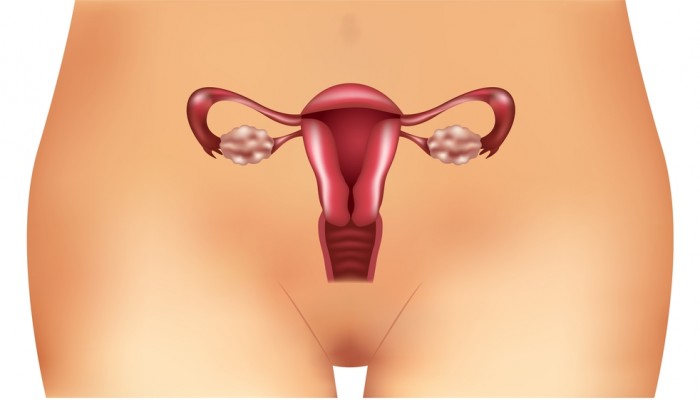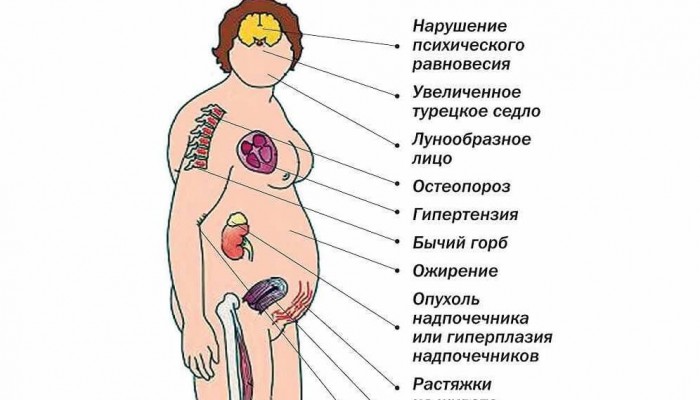The menstrual cycle is an indicator of a woman's health, a reflection of the normal functioning of her reproductive system. Any deviations in his rhythm, the appearance of irregular periods should definitely alert a woman. But sometimes it also happens that menstruation disappears completely. Why is this happening, and what to do if your period stops?
Menses
Menstruation is the final stage of the monthly cycle. They begin if fertilization does not occur and the preparation of the body for pregnancy is in vain. In order to start preparing for conception again, the uterus rejects the inner layer of its shell. Particles of mucous membrane along with bloody discharge are menstruation. That is why the first thought in the disappearance of menstruation will be about a possible pregnancy. Since endometrial rejection has not occurred, it is likely that an embryo has attached to it, and the woman's pregnancy progresses.
Pregnancy

How to understand if the disappearance of menstruation is associated with pregnancy? If in this cycle the woman had at least one sexual intercourse, first of all, you need to think about the possible conception. Precautions do not give a 100% guarantee, regardless of their type.
Oral contraceptives, hormonal rings, local suppositories and ointments, condoms do not exclude possible pregnancy. If, for the purpose of protection, the calendar method or interrupted intercourse was used, then it becomes very likely.
In rare cases, pregnancy occurs even if sex was on the eve of the previous menstruation due to a shift in ovulation. And, although this phenomenon is not too common, conception cannot be ruled out. What to do if menstruation has stopped and there are suspicions of pregnancy?
Confirmation of pregnancy

If, according to all calculations, menstruation should come, but it does not, it is better to buy a test to determine pregnancy. They are sold in any pharmacy and come in different prices and sensitivities.
When is the best time to use the test? It is not necessary to do this from the first days of the expected delay. It is better to wait 2-3 days for even the least sensitive test to become informative.
If the indicator shows two stripes, pregnancy is obvious, and you should not be surprised at the absence of menstruation. False positive tests are extremely rare, only in the case of serious hormonal diseases.
But what if the test is negative and your period doesn't start? First of all, you need to repeat the study in 3-5 days. Sometimes - due to late ovulation - the level of hormones in the blood does not have time to rise by the day of the expected delay. In this case, it will not be determined by the indicator. However, after a few days, the test will come back positive.
The most reliable method of confirming pregnancy will be an ultrasound of the uterus. This study is informative one to two weeks after the disappearance of menstruation, but it will show for sure whether the delay is due to pregnancy or other reasons need to be looked for.
Reasons for the delay
If there was no sexual intercourse the day before or pregnancy was ruled out, you should think about other reasons for the disappearance of menstruation. There are quite a few of them. Violation of the menstrual cycle can be associated with both pathological and physiological processes.
Delay does not always mean illness. This can be temporary, transient, or even a variant of the norm. But in some cases, the disappearance of menstruation indicates serious hormonal disruptions in the body. There are three main groups of reasons for an irregular menstrual cycle or complete absence of menstruation:
- physiological.
- pathological.
- external influence (reversible disappearance of menstruation).
Physiological causes
The physiological reasons for the absence of menstruation include natural processes occurring in the female body. This is primarily:
- Growing up, transition from childhood to adolescence, puberty.
- Aging - menopause and menopause.
- The work of the reproductive system - pregnancy and lactation.
With a confirmed pregnancy, the disappearance of menstruation is not surprising, just like their absence when breastfeeding. But in adolescence or after 45 years, the disappearance of regular bleeding can make a woman or girl seriously worried. In fact, there is usually no cause for alarm in these situations.
Teenage years

In adolescence, a girl has her first periods, they are called menarche. This happens in the interval between 10 and 16 years, more often in 12-14 years. As soon as the first bleeding occurs, the teenager can expect that it will recur in a month. But menstruation disappears for a long time. Why is this happening, and is the absence of menstruation a pathology?
No, for the formation of the menstrual cycle, this is an absolutely normal course. But not all girls and their mothers know about it. During the first year after the appearance of menarche, the cycle has the right to be very irregular. Menstruation may disappear for two to three weeks and then reappear, be different in volume and duration. The alarm should be sounded in two cases:
- If this continues after a year from the onset of menses.
- If a girl has sex with questionable contraception.
So that the disappearance of the usual bleeding does not come as a surprise to a teenager, after the appearance of menarche, it is worth recommending her a consultation with a pediatric gynecologist. The doctor will be able to explain in an accessible way all the features of the female cycle in this period and the symptoms that should alert the girl.
Menopause and menopause

As the reproductive function fades away, menstruation becomes irregular and once completely disappears. Most women are aware of these features of their body and take them calmly. Usually menopause occurs after 50–55 years. However, in some situations, the disappearance of menstruation can alert a woman. When does this happen?
Sometimes menopause begins early. It can come at 36 years old. Typically, such pathologies are observed in women over several generations. There is also an artificial menopause, caused by the prompt removal of the ovaries, uterus or drug suppression of their function. If a woman has received appropriate treatment, the doctor must warn her about the subsequent disappearance of monthly bleeding.
There is also another situation. Gradually disappearing menstruation in menopause does not exclude the possibility of getting pregnant. And their sudden disappearance after a few months can turn into a surprise for a woman. Moreover, some people retain the ability to conceive even after one or two years after menopause, so it is better not to tempt fate and not forget about contraceptives even with menopause.
Pathological causes
Abnormal absence of menstruation (amenorrhea) is caused by many diseases. Since the female cycle is regulated by many hormones, the cause of amenorrhea in the vast majority of cases is dyshormonal diseases. They can be gynecological or endocrinological and show different symptoms.
If menstruation disappears after a regular cycle has been established, this phenomenon is called secondary amenorrhea. What symptoms will help to suspect the pathological disappearance of menstruation? Most often, these will be the following unusual manifestations:
- The cessation of menstruation against the background of a lack of sexual activity.
- Sudden sharp weight gain - the development of obesity.
- The appearance of hair all over the body and on the face or a change in their structure and color - coarsening, darkening.
- The appearance of pigmentation on the body or face.
- Hair loss on the head, the appearance of areas of baldness.
- The formation of red-purple stretch marks on the abdomen, sides, hips - stretch marks.
- Dramatic weight loss, severe weakness.
- Discharge from the mammary glands of a white liquid - milk.
What if a woman suddenly stops menstruating and has these symptoms? First of all, you should contact your gynecologist to establish a preliminary diagnosis. He will send you for the necessary examination and, if necessary, for examination by an endocrinologist.
Of the diseases accompanied by a violation of the female cycle, endocrinological pathologies are quite common. These include:
- Polycystic ovary syndrome.
- Galactorrhea-amenorrhea syndrome.
- Itsenko-Cushing's disease.
Polycystic ovary syndrome

As the name implies, with this pathology, the structure of the ovaries changes. Many cysts form in them, which leads to dysfunction. The ovaries are responsible for the exchange of female sex hormones and the secretion of eggs capable of fertilization. With this syndrome, their work can be significantly impaired.
In mild cases, polycystic ovary syndrome manifests itself only in periodic anovulatory cycles. This means that in the middle of the month, the matured egg does not enter the fallopian tube, and fertilization is impossible. However, bleeding at the beginning of the cycle persists.
Severe forms of the disease are characterized by the complete cessation of menstruation. In addition, hormonal metabolism is significantly impaired. Women with polycystic ovaries are characterized by obesity, acne, and excessive hair growth. If these symptoms have appeared recently and menstruation has disappeared, you should contact your gynecologist-endocrinologist as soon as possible to clarify the diagnosis.
Polycystic ovary syndrome can be treated with adequate therapy. Sometimes you have to carry out surgery. Why is polycystic ovary syndrome so dangerous? Lack of treatment for this disease leads to persistent infertility.
Galactorrhea-amenorrhea syndrome

There is another endocrinological pathology in which menstruation suddenly disappears. It is also characterized by a second specific symptom - white discharge from the breast, which looks like milk or colostrum. Actually, they are. Galactorrhea-amenorrhea syndrome is caused by excess prolactin production. Its second name is hyperprolactinemia syndrome. Why is such amenorrhea dangerous for a woman?
Prolactin isn't just about blocking menstruation. First of all, it suppresses ovulation. Breaking the cycle is just a consequence. The main danger of hyperprolactinemia is caused by infertility. But that's not all.
Excess prolactin is easily eliminated with bromocriptine tablets, and the woman's reproductive function is restored. And with her, menstruation also returns. However, the insidiousness of galactorrhea-amenorrhea syndrome lies in the cause that caused it. Often, prolactin begins to be produced in excessive quantities due to a pituitary tumor - prolactinoma.
As a rule, it refers to benign formations - adenomas. But adenomas tend to grow in size over time, compressing the surrounding structures of the brain. Large prolactinomas manifest themselves as persistent headaches, blurred vision and disappearance of menstruation. Surgical treatment is not always possible due to the difficulty of accessing the tumor. What to do in such a situation?
To date, drug treatment gives good results, but it is effective in the early stages. Therefore, it is so important to see a doctor in a timely manner.
Also, galactorrhea-amenorrhea syndrome can develop for other reasons:
- Chest trauma.
- Over-stimulation of the nipples to simulate sucking.
- Taking certain medications, such as metoclopromide (Cerucal).
- Decreased thyroid function - hypothyroidism.
The cessation of menstruation in combination with discharge from the chest is a reason for a mandatory examination by a gynecologist, followed by an additional examination.
Itsenko-Cushing's disease

This pathology proceeds in the form of two variants - an independent disease and a separate syndrome caused by various factors. Its symptoms are the same in both cases. With Itsenko-Cushing's disease, there is a violation of the metabolism and work of adrenal hormones. And these organs of internal secretion control the functioning of all body systems.
Patients with Itsenko-Cushing's disease or syndrome have a characteristic appearance:
- Overweight.
- Moon-like face with red or crimson blush.
- Significant apron-shaped abdominal fat and flattened buttocks due to muscle atrophy.
- Thin, pale skin.
- Red or purple stretch marks on the abdomen and back are striae.
- Thin, brittle hair.
In addition, this pathology is characterized by severe osteoporosis, heart disease, and frequent occurrence of diabetes mellitus. On the part of the reproductive system, with the development of Cushing's disease, an irregular cycle is observed, and then menstruation stops completely. The woman has persistent amenorrhea.
Cushingoid syndrome can develop with prolonged treatment with steroid hormones or when used in high doses.
External influence
Amenorrhea caused by external factors usually has a better prognosis than pathological, and rarely requires special treatment. As a rule, menstruation is restored as soon as the external influence disappears.
A woman's reproductive system is designed in such a way that she can only work in favorable conditions. When something seriously threatens the health and life of a woman's body, the ability to bear children is blocked. And it makes practical sense. In extreme conditions, the body must take care of itself first of all. If a woman becomes pregnant during this period, she will endanger her own health.
That is why menstruation is directly related to body weight, nutrition and physical activity. In addition, the psychological factor is also important.
Nutrition and body weight

As soon as body weight reaches a critical level, menstruation disappears. Each woman has her own threshold for the onset of amenorrhea. Nature takes care of first of all to restore the body's strength, and only then restores the ability to conceive and normalizes the menstrual cycle.
Menses in women can disappear during wars, hunger and hardship, when ovulation is blocked and they become infertile. In the future, with normal nutrition, menstruation is restored on its own, as well as ovulatory cycles.
Currently, such amenorrhea is not uncommon in girls who practice various diets. Often, in pursuit of an imaginary ideal, they bring themselves to real exhaustion. And the disappearance of menstruation in such a situation is not the most dangerous symptom. This phenomenon has been very common among teenage girls in recent years. If the level of their biological literacy is low, the disappearance of menstruation will not scare them, and they will not turn to a doctor in a timely manner. At a young age, such a violation of the menstrual cycle is fraught with serious complications in the future.
The appearance of amenorrhea against the background of exhausting or exotic diets, excessive weight loss requires an immediate rejection of fasting and return to the usual diet. Consultation of a gynecologist and a psychologist is also desirable.
Physical exercise
Hunger is not the only thing that causes the body to block reproductive function. Increased energy consumption leads to the same result. We are talking about excessive physical exertion - playing sports.
When the body spends all its energy on achieving some results, pregnancy is very undesirable for it. That is why amenorrhea in female athletes is not uncommon. It cannot be called pathological, but the disappearance of menstruation is not attributed to physiological processes either. Rather, it is a compensatory reaction of the body to an exorbitant load.
Often menstruation can disappear on the eve of important competitions, when the pace of training is too high. As the workload decreases, the female cycle usually recovers without problems.
Psychological factor

Psychological factors can also lead to the disappearance of menstruation. Constant stress, excitement, depression often cause menstrual irregularities, up to persistent amenorrhea. As soon as the situation in the family and at work returns to normal, the stress factor disappears and your periods return.
Occasionally, amenorrhea occurs with a false pregnancy. This condition develops when a woman dreams of a child very strongly, but for some reason, conception does not occur. Sometimes the power of mental suggestion on the body becomes so great that menstruation disappears, the breast increases and toxicosis appears. This condition can last for a very long time without treatment.
It happens that menstruation disappears for a while when moving, changing climate, traveling. Both psychological and physical factors can play a role here.
Amenorrhea is a serious symptom. It can be a sign of pregnancy or a physiological process, but it can also indicate dangerous hormonal diseases of the body. Do not brush it off if your period suddenly disappears. It is better to consult a doctor in a timely manner and undergo the necessary examination.

